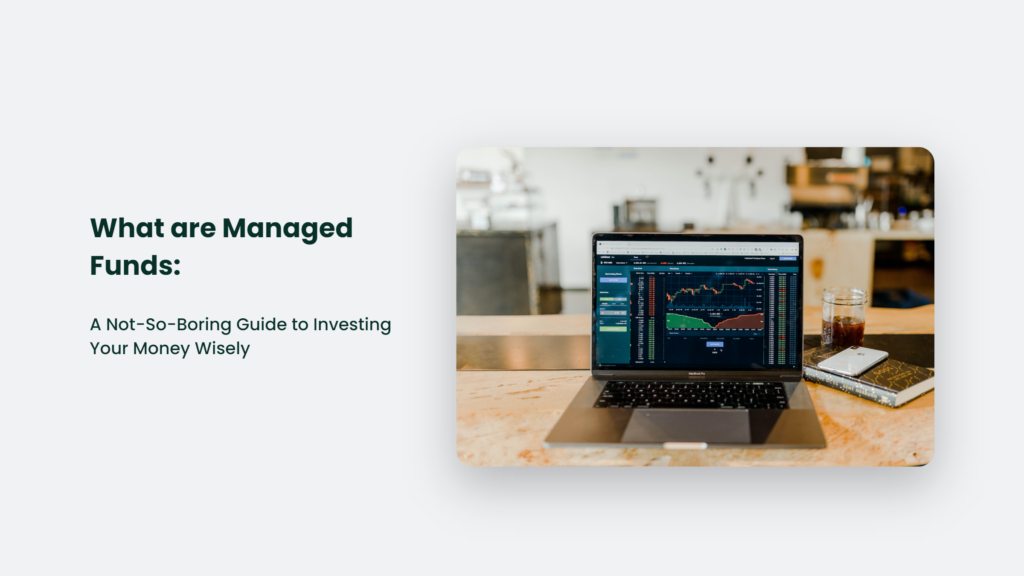

What are Managed Funds: A Not-So-Boring Guide to Investing Your Money Wisely

As Seen On
What are managed funds? No, they’re not the latest addition to your list of unread self-help books, nor are they some kind of secret society for the financial elite. Managed funds are a legitimate way to give your hard-earned money the vacation it deserves while it works tirelessly for you.
But beware, this isn’t an all-inclusive, beach-side resort type of vacation. No, this is more like a mountaineering expedition – fraught with challenges but rewarding for those who dare.

What are Managed Funds: It’s All About the Teamwork
First, let’s get the boring definition out of the way. A managed fund is essentially a pool of money from multiple investors, managed by a professional fund manager who makes investment decisions on behalf of the group. Think of it as handing over your money to a hired gun, a financial gunslinger who bravely ventures into the wild west of the stock market.
The thing is, in the world of finance, there’s no such thing as a lone ranger. It’s all about teamwork. It’s like the Avengers, but they’re battling market volatility instead of fighting off intergalactic threats.
The Benefits of Managed Funds: Yes, There Are Perks
Let’s imagine you’re planning a road trip. You could choose to go it alone, navigating the twists and turns of the highway, figuring out the best pit stops, and keeping your eyes peeled for potential hazards.
Or, you could hire a seasoned driver, a professional who knows the roads like the back of their hand, can avoid the potholes, and knows the best places to stop for a burger. Which one sounds more appealing?
This dear reader, is the beauty of managed funds. They’re like your personal chauffeur on the road trip of investing. They handle all the heavy lifting, freeing you to sit back, relax, and enjoy the ride.
Diversification: The Spice of Life
First up on the list of perks is diversification. In layman’s terms, diversification is the investment version of not putting all your eggs in one basket. Managed funds offer an array of investment opportunities, from shares and bonds to property and infrastructure. It’s like a buffet of investments, allowing you to sample a bit of everything instead of filling up on just one dish.
Professional Management: Your Personal Investment Maestro
Next up, we have professional management. Managed funds are run by investment professionals who eat, sleep, and breathe finance. They’re like the maestros of the investment world, skillfully orchestrating a symphony of investments that work in harmony to achieve your financial goals.
Convenience: Making Life Easier
Last but certainly not least is convenience. Let’s face it, not everyone has the time, knowledge, or desire to manage their investments. With managed funds, you can delegate this task to professionals, freeing up your time to do the things you love.
The Dark Side of Managed Funds: All That Glitters Is Not Gold
Now, I know what you’re thinking. “Sign me up!” But hold your horses, partner. Managed funds come with their own set of drawbacks. Like an all-you-can-eat buffet, there’s a price to pay for indulging in such variety. Management fees, anyone?
Then, there’s the risk factor. Remember our mountaineering analogy? Well, not all expeditions reach the summit. Sometimes, the weather conditions (read: market volatility) can play spoilsport.
Examples of Managed Funds: A Brief Tour
Managed funds come in all shapes and sizes. Let’s take a quick tour:
- Equity Funds: These are like the popular kids at school; everyone wants a piece of them. They invest primarily in stocks and carry a higher risk, but the potential returns are enough to make your eyes water.
- Fixed Income Funds: The reliable, steady Eddies of managed funds. They invest in bonds and other fixed-income securities, offering lower risk and returns.
- Index Funds: These are the copycats of the fund world. They aim to replicate the performance of a specific index like the S&P 500.
- Balanced Funds: The Goldilocks of managed funds. Not too risky, not too safe, but just right. They invest in a mix of equities and fixed-income securities.
Statistics That Make Managed Funds Worth Your While
Now, let’s get down to the nitty-gritty. The cold, hard facts that make managed funds a worthy contender for your investment portfolio:
- As of 2021, over 9,500 managed funds were in the U.S., managing assets worth over $21 trillion. That’s a trillion with a ‘T,’ folks.
- Passive funds have seen a whopping 66% decline in asset-weighted fees since 1990, landing at a modest 0.12% in 2021. On the other hand, active funds experienced a 34% decline, with an average fee of 0.60% in 2021.
- Over the period 2017 through 2021, the average expense ratio for passive funds dropped 8%, and for active funds, it dropped 12%
And there you have it. If these figures don’t make you sit up and take notice, I’m not sure what will. Unless you’re more of a visual person, in which case, imagine a giant snowball rolling down a hill, gathering speed and momentum.
That’s what’s happening with the popularity and growth of managed funds.
Common Misconceptions About Managed Funds: Let’s Set the Record Straight
Now, I want you to close your eyes. Imagine a world where everyone understands managed funds. The mere mention of the term doesn’t lead to glazed eyes and yawns. Sounds too good to be true? Buckle up because we’re about to shatter some common misconceptions about managed funds.
- Managed funds are only for the rich: False. It’s like saying gourmet food is only for chefs. Managed funds are for everyone, whether you’re a seasoned investor or a newbie.
- Managed funds are a surefire way to get rich: False. If it were that easy, we’d all be cruising on yachts. Managed funds carry risks, just like any other investment.
- Managed funds are complicated: False. They may seem like a Rubik’s cube at first, but once you understand the basics, they’re as simple as pie.
Frequently Asked Questions:
Are managed funds a safe investment?
Like riding a bicycle, investing in managed funds carries its own set of risks. But with the right helmet (read: diversification), you can mitigate some of these risks.
How do I choose the right managed fund?
Remember Goldilocks? Just like her, you need to find the fund that’s “just right” for you. Consider your financial goals, risk tolerance, and investment horizon.
How are managed funds different from mutual funds?
Think of mutual funds as a type of managed fund. All mutual funds are managed funds, but not all managed funds are mutual funds.
The Bottom Line:
In conclusion, managed funds present a worthwhile avenue for investment, offering the benefits of diversification, professional management, and convenience. These funds are not just a financial instrument for the wealthy but a tool available to everyone, regardless of their investment experience. While they carry risks and costs in management fees, the overall downward trend in these fees and the increasingly competitive landscape make these funds more attractive.
Diversification in managed funds allows investors to spread risk across various asset classes like stocks, bonds, and property. It helps to mitigate potential losses, as gains in another can balance the impact of poor performance in one sector.
With professional management, you are assured that your investments are being handled by experts with the knowledge and experience to navigate the complexities of the financial markets. It can be particularly beneficial for those lacking the time or expertise to manage their investments.
Convenience is another key advantage. Managed funds can simplify the investment process by consolidating your investments into a single portfolio managed on your behalf. It can save you time and effort and provide you with access to investment opportunities that might be difficult to achieve independently.
However, as with any investment, it’s important to understand the potential risks. Market volatility can impact fund performance, and there’s always the possibility that you could lose some or all of your investment. It’s also essential to be mindful of the fees associated with managed funds, as these can eat into your returns over time.
Ultimately, managed funds offer a compelling mix of benefits for investors. Whether you want to diversify your portfolio, take advantage of professional management, or simplify your investing process, managed funds could be a great fit. Just be sure to research, understand the potential risks, and ensure that any fund you choose aligns with your financial goals and risk tolerance.
Konger
Up until working with Casey, we had only had poor to mediocre experiences outsourcing work to agencies. Casey & the team at CJ&CO are the exception to the rule.
Communication was beyond great, his understanding of our vision was phenomenal, and instead of needing babysitting like the other agencies we worked with, he was not only completely dependable but also gave us sound suggestions on how to get better results, at the risk of us not needing him for the initial job we requested (absolute gem).
This has truly been the first time we worked with someone outside of our business that quickly grasped our vision, and that I could completely forget about and would still deliver above expectations.
I honestly can't wait to work in many more projects together!
Disclaimer
*The information this blog provides is for general informational purposes only and is not intended as financial or professional advice. The information may not reflect current developments and may be changed or updated without notice. Any opinions expressed on this blog are the author’s own and do not necessarily reflect the views of the author’s employer or any other organization. You should not act or rely on any information contained in this blog without first seeking the advice of a professional. No representation or warranty, express or implied, is made as to the accuracy or completeness of the information contained in this blog. The author and affiliated parties assume no liability for any errors or omissions.

